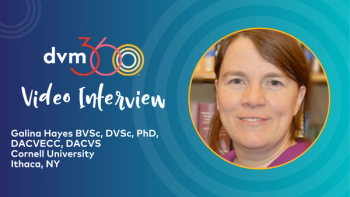
An Interview with Dr. Joseph Harari
This surgeon advises new graduates to see as many cases as possible early in their careers. "Experiences in dealing with animals, disease, clients, and peers will provide the intellectual, physical, and psychological supports needed for long-term survival in the clinical arena."
Joseph Harari, MS, DVM, DACVS, is a co-owner of Veterinary Surgical Specialists in Spokane, Wash. He is the author of several small-animal surgery books and is a Veterinary Medicine editorial advisory board member.
What is the most exciting change you've seen in veterinary medicine?
The increase in specialty fields and associated technical advances such as imaging, cancer therapies, anesthesia and analgesia, surgical implants, infection control, and medical therapies and in the dissemination of knowledge.
Joseph Harari, MS, DVM, DACVS
Who inspired you most in your career?
My teachers (both mentors and tormentors) at Washington State University, where I attended graduate and professional school; the California Animal Hospital in Los Angeles, where I interned; Michigan State University, where I got my pathology training; and the University of Illinois, where I completed my surgical residency. These faculty members of the 1970s and '80s had a vision to stimulate, educate, and push students to achieve high goals. They weren't encumbered by the politically correct bureaucracy that seems so pervasive and stifling now.
What was the best professional advice you ever received?
Dr. C.W. Smith, the head of small animal surgery at the University of Illinois, taught us residents that if you preoperatively anticipate worst-case scenarios, then intraoperative problems are not a surprise and can easily be handled. He was probably an airline pilot in a previous life.
What would you advise a new graduate?
See as many cases as possible early in your career. These experiences in dealing with animals, disease, clients, and peers will provide the intellectual, physical, and psychological supports needed for long-term survival in the clinical arena. And don't forget to read a lot—knowledge is power.
What would you have liked to do if you hadn't become a veterinarian?
Be a gold-medal-winning Olympic athlete, carrying the U.S. flag around a stadium and hearing the national anthem played in front of millions of Americans, our supporters, and our detractors. A close second would be kicking the winning goal for an underdog U.S. national soccer team in a World Cup championship game against a traditionally superior foe whose international policies have caused us grief.
Are you a cat person or a dog person?
I've always lived with two cats and a Labrador retriever. My expert medical opinion is that dogs drool while cats rule.
What favorite musicians would you include on your personal jukebox?
Classical pieces, music from the '60s—especially Motown—and Natalie Merchant, Soraya, and the Austin Lounge Lizards. Rap, VH-1, and MTV should be used by the military to drive Bin Laden and the Taliban out from their caves in Pakistan and Afghanistan, just like we did with hard rock and Noriega in Panama. I would give anything to go out on a date with Linda Ronstadt or Tina Turner.
Do you have a bad habit?
Bad is in the eyes of the beholder. I enjoy sarcastic humor, although several friends of mine who are psychiatrists have commented that it's a sign of hostility. I rejected their hypothesis and stopped seeing them socially.
What part of your work do you enjoy most?
Meeting clients, interacting with patients, alleviating animal suffering, making people happy, and doing what I was trained to do—surgery. I always wanted to be a veterinarian and am grateful to have accomplished that goal.
What do you consider the greatest threat to the profession?
Lawyers, animal activists, corporations, politicians, and more lawyers.
What is the greatest achievement of your career?
Returning to Israel, my birthplace, for lectures and surgeries. Operating on a poodle patella in 3,500-year-old Jerusalem and teaching colleagues in a kibbutz were emotionally overwhelming.
What makes a good veterinarian?
A good veterinarian is a hard-working, compassionate, humble, intelligent, scientifically curious, objective, realistic, happy person who realizes, to paraphrase the words of legendary French surgeon Ambroise Paré, that often we treat the wound and God and nature heal it.
Newsletter
From exam room tips to practice management insights, get trusted veterinary news delivered straight to your inbox—subscribe to dvm360.




